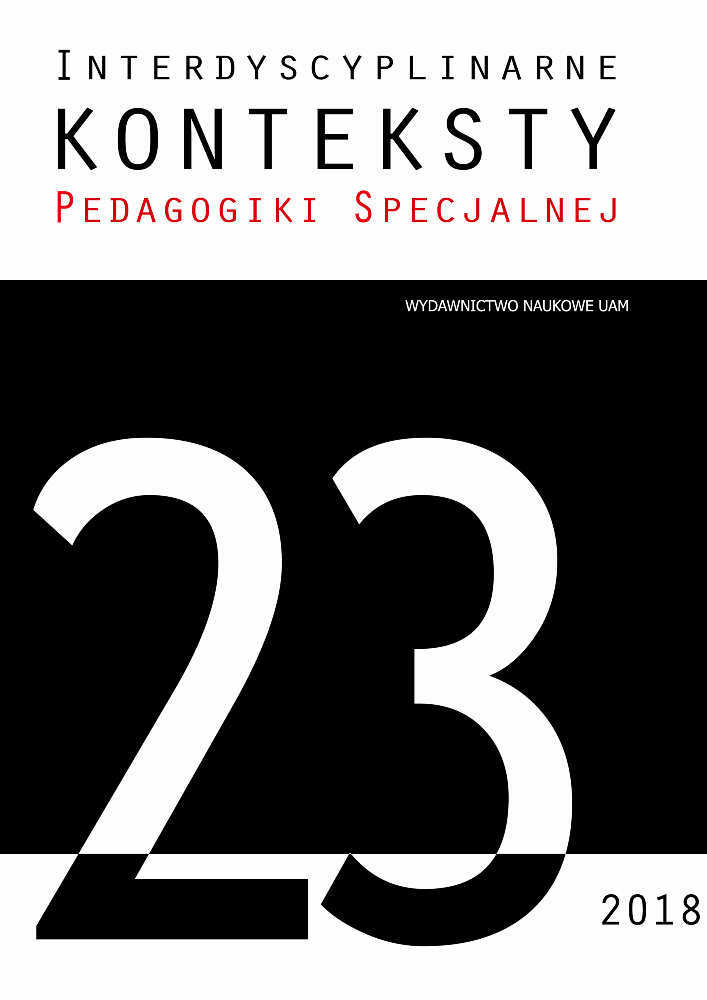Abstract
Agnieszka Iwanicka, Od biernego odbiorcy do aktywnego mediakreatora – małe dzieci i TIK w świetle badań własnych [From passive recipients to active mediacreators: small children and ICT in the light of own studies]. Interdyscyplinarne Konteksty Pedagogiki Specjalnej, nr 23, Poznań 2018. Pp. 143-160. Adam Mickiewicz University Press. ISSN 2300-391X. DOI: https://doi.org/10.14746/ikps.2018.23.08
Small children show a lot of media activity: they are perfectly capable of handling new technologies, they have been using them since the first years of their life. What activities they show depends on the family home and the behaviors they observe with their parents. With their support and providing positive patterns, the child can become not only a passive media user, but also an active media content creator, a kind of mediacreator, which over time will have a real impact on the reality in which he grows up. In the article, I present some of the results of the my research, in which I checked what role the media plays in the life of a child in an early school age. I try to answer the question, what media activities are displayed by children – whether it is only passive and imitative, or maybe they are actively creating media content.
References
A Common Sense Media Research Study, Zero to eight. Children’s Media Use in America in 2011, 2013, https://www.commonsensemedia.org/research/zero-to-eightchildrens-media-use-in-america-2013 [dostęp: 10.08.2018].
Batorski D., Dzieci z sieci – dostęp i korzystanie z internetu przez dzieci w wieku przedszkolnym, [w:] Małe dzieci w świecie technologii informacyjno-komunikacyjnych. Pomiędzy utopijnymi szansami a przesadzonymi zagrożeniami, red. J. Pyżalski, Wydawnictwo„Eter”, Łódź 2017.
Batorski D., Technologie i media w domach i życiu Polaków, [w:] Diagnoza społeczna 2015: Warunki i jakość życia Polaków, red. J. Czapiński, T. Panek, Rada Monitoringu Społecznego, Warszawa 2015.
Dunkels E., Franberg G.M., Hallgren C., Young people and online risks [w:] Youth Culture and Net Culture: Online Social Practices, red. E. Dunkels, G-M. Franberg, C. Hallgren, I-Global 2011, http://www.mucf.se/sites/default/files/youngpeople-and-online-risk.pdf [dostęp: 11.08.2018].
Finkelhor D., Mitchell K.J., Wolak J., Online victimization: A report on the nation’s youth, National Center for the Missing and Exploited Children, Alexandria 2000, http://www.unh.edu/ccrc/pdf/Victimization_Online_Survey.pdf [dostęp: 11.08.2018].
Hurlock E.B., Rozwój dziecka, Wydawnictwo Naukowe PWN, Warszawa 1985.
Juszczyk-Rygałło J., Wczesnoszkolna edukacja medialna jako wprowadzenie do edukacji całożyciowej, Prace Naukowe Akademii im. Jana Długosza w Częstochowie, Pedagogika 2015, t. XXIV, Akademia im. Jana Długosza w Częstochowie, Częstochowa 2015.
Kabali H. i in., First Exposure and Use of Mobile Media in Young Children, Pediatric Academic Societies’ Annual Meeting, 25–28.04.2015, San Diego 2015, http://www.abstracts2view.com/pas/view.php?nu=PAS15L1_1165.3 [dostęp: 11.08.2018].
Kalaš I., Recognizing the Potential of ICT in Early Childhood Education, UNESCO Institute for Information Technologies in Education, Moscow 2010, https://iite.unesco.org/publications/3214673/ [dostęp: 10.08.2018].
Kemp C., Babies as young as 6 months using mobile media: Survey shows most 2-year-oldsusing mobile devices, with some spending more than an hour a day on screens, AAP News, https://www.aap.org/en-us/about-the-aap/aap-press-room/pages/Babies-as-Young-as-6-Months-Using-Mobile-Media.aspx [dostęp: 10.08.2018].
Lenhart A., Madden M., Macgill A.R., Teens and Social Media, Pew Internet & American Life Project, 2009, http://www.pewinternet.org/2018/05/31/teens-socialmedia-technology-2018/ [dostęp: 10.08.2018].
Livingstone S., Haddon L., EU Kids Online: Final report. LSE, London 2009, http://www.lse.ac.uk/media@lse/research/EUKidsOnline/EU%20Kids%20I%20(2006-9)/EU%20Kids%20Online%20I%20Reports/EUKidsOnlineFinalReport.pdf [dostęp:10.08.2018].
Łobocki M., Wprowadzenie do metodologii badań pedagogicznych, Oficyna Wydawnicza „Impuls”, Kraków 2004.
Marsch M. i in., Digital Begginings: Young children’s use of popular culture, media and new technology, Sheffield 2015.
Podstawa programowa kształcenia ogólnego dla szkoły podstawowej, http://edukacjawczesnoszkolna.edu.pl/wpcontent/uploads/2017/02/podstawa_programowa_2017_sp_edukacjawczesnoszkolnaedupl.pdf [dostęp: 1.08.2018].
Papert S., Burze mózgów. Dzieci i komputery, Wydawnictwo Naukowe PWN, Warszawa 1996.
Przetacznik-Gierowska M., Makiełło-Jarża G., Psychologia rozwojowa i wychowawcza wieku dziecięcego, Wydawnictwa Szkolne i Pedagogiczne, Warszawa 1992.
Pyżalski J., Od paradygmatu ryzyka do paradygmatu szans: prorozwojowe i prospołeczne używanie internetu przez dzieci i młodzież, [w:] Nastolatki wobec internetu, red. M. Tanaś, NASK, Warszawa 2016, https://akademia.nask.pl/publikacje/Nastolatki_wobec_internetu_.pdf [dostęp: 11.08.2018].
Resnick M., Computer as Paintbrush: Technology, Play, and the Creative Society, [w:] Play = Learning: How play motivates and enhances children’s cognitive and socialemotional growth, red. D. Singer, R. Golikoff, K. Hirsh-Pasek, Oxford University Press 2006, http://www.computerclubhouse.org/sites/default/files/Computer
AsPaintbrush_Singer.pdf, [dostęp: 10.08.2018].
Unicef, The State of the World’s Children 2017: Children in a Digital World, https://www.unicef.org/publications/index_101992.html [dostęp: 9.06.2018].
Walat A., Wprowadzenie do języka i środowiska Logo, OEIiZK, Warszawa 1996. Zevenbergen R., Logan H., Computer use by preschool children: Rethinking practices as digital natives come to preschool, Australian Journal of Early Childchood, 2008, https://research-repository.griffith.edu.au/bitstream/handle/10072/23047/53
_1.pdf;jsessionid=5AECB87B4BB315B523C9AD98D3513C3F?sequence=1 [dostęp:10.08.2018].
